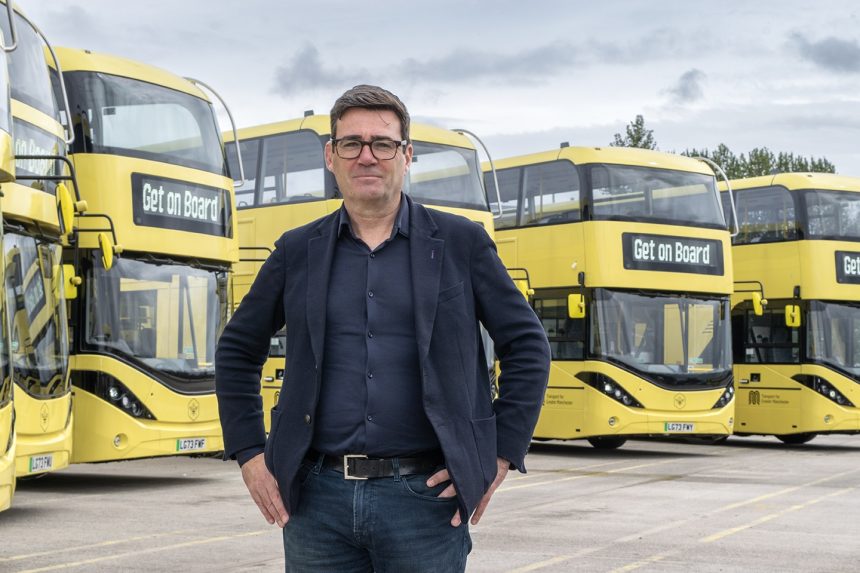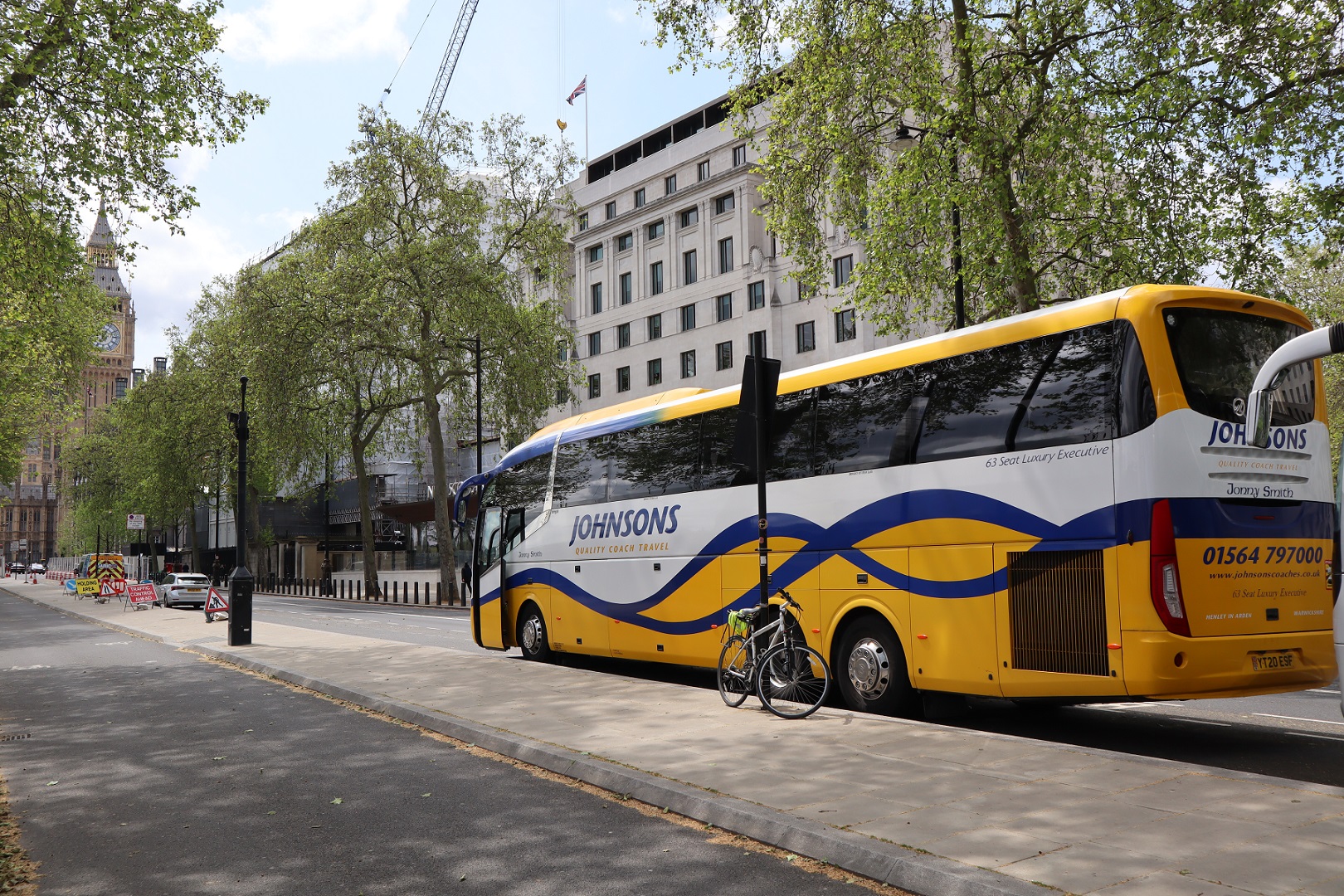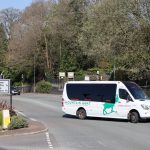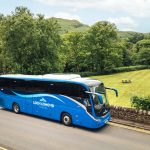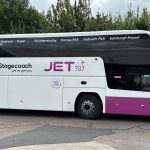The first tranche of bus franchising in Greater Manchester launched soon after 0500hrs on Sunday 24 September. Go North West (GNW) has taken on the two large local service contracts centred on Bolton and Wigan via the opening tranche of reregulation, with Rotala taking on the small contracts.
Among those present at GNW’s Weston Street depot in Bolton to see the first Bee Network bus leave were Mayor of Greater Manchester Andy Burnham (pictured, above) – who made the decision in 2021 to proceed with franchising – and Go-Ahead Group Chief Executive Christian Schreyer.
Mr Burnham describes the launch as “a coming of age moment for English devolution.” He adds that Greater Manchester is “blazing a trail for other city regions [that] are ready to follow our lead in reversing the failed bus deregulation experiment and creating an integrated transport network that is run in the interest of, and accountable to, our communities.”
Passengers can rate journeys made on the Bee Network. Results will be combined with “a range of other customer-related performance targets” to “inform what operators get paid,” adds Mr Burnham.
Both he and the Greater Manchester Combined Authority wasted no time in again highlighting how bus use dropped under the deregulated regime introduced in 1986. It declined from 355 million journeys per year then to 182 million in 2019. Transport for Greater Manchester (TfGM) aims to add 50 million additional bus trips per year by 2030.
However, the Greater Manchester Bus Strategy document published on the TfGM website shows how ridership in the conurbation has been on a downward trajectory since at least 1975-76, when buses were in public control. During that year, usage was well over 500 million. It was at around 350 million by 1983-84.
Battery-electric bus deployment in franchising first tranche
24 September also saw entry into service of most of the 50 BYD ADL Enviro400EV battery-electric double-deckers ordered by TfGM for the first round of franchising. They will be followed by 50 more in the second tranche in early 2024. 170 Volvo BZL battery-electrics on order for Stagecoach Manchester in Stockport will also become part of the Bee Network via the third and final tranche in 2025.
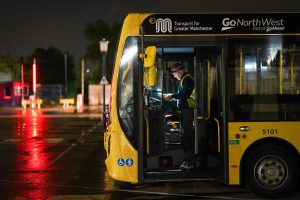
Work to move buses for the first round had been ongoing for some time.
The contracts awarded to GNW include services on the Leigh guided busway formerly with First, for which a batch of Volvo B5LH diesel-electric hybrids equipped with guidewheels have transferred.
Rotala has begun its small franchises largely with a transitional fleet ahead of the delivery of new buses in 2024. That includes a number of mid-life Wrightbus StreetLites that were previously returned off-lease by First Bus subsidiaries in other parts of the country, and which carry Diamond Bus livery.
Go North West borrows 83 drivers from elsewhere
Over 600 Go-Ahead employees were involved in the launch. Among them are 83 drivers seconded from other parts of the group’s UK bus operations, from the North East to Cornwall. GNW issued commemorative medals to staff members, with those also marking former operators of the services involved.
Volunteer drivers are on loan for what Go-Ahead says is a three-month period “to ensure that the Bee Network launch goes smoothly while new drivers are being trained.” Temporary staff received route training, an introduction to Manchester, and vehicle familiarisation ahead of rollout of the contracts.
70 new drivers have also been recruited, with GNW Managing Director Nigel Featham saying that the loanees “will tide us over while we train hundreds of home-grown new drivers in Manchester who are going through our bus driver academy.”
New tech is prominent in Manchester bus franchising rollout
Also part of the launch is deployment of the first phase of an integrated ticketing and real-time information (RTI) solution from Ticketer. Bee Network services introduced on 24 September are the first anywhere to benefit from its Smart Gateway and its Next Generation ETM ticket machines.
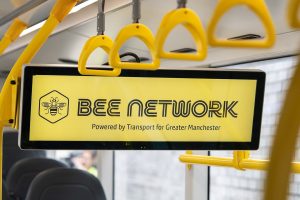
The latter bring faster processing and greater memory, along with faster acceptance of contactless payments.
Those units connect to the Smart Gateway, which provides “an ecosystem of connectivity for on-bus IT infrastructure,” Ticketer adds. That reduces the amount of SIMs and hardware on vehicles and delivers enhanced monitoring of battery-electric buses.
Franchised buses in Greater Manchester will additionally benefit from the complementary RTI solution. It provides extra functionality including disruption management, corridor management, on-bus inventory management, and advanced tracking, among others.
Changeover led to driver shortages for outgoing operator
Vision Bus, which as part of the first round of franchising has ceased operating all but two bus services, has sportingly wished the new operators well. However, in a social media post, Vision noted that it had suffered “operational issues” over the previous fortnight caused by drivers “leaving us early to join the new operators.” Vision continues to operate home-to-school services for TfGM.
GNW says that including the 50 BYD ADL Enviro400EVs, 102 new buses will form part of its fleet in Bolton and Wigan. The overall vehicle total involved is 320. According to unconfirmed local media reports, Weston Street has been equipped with a number of HVO-fuelled generators to act as back-up power providers for the battery-electrics.
Speaking shortly after the first regulated services had operated, Mr Featham added that “the response we have had from the public… has been terrific.”




















